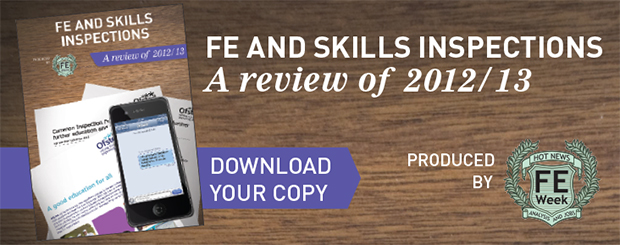Ofsted’s criticism of the college sector last year was a bitter pill to swallow and the toughened up common inspection framework offered little hope for sector praise. However, it hasn’t quite worked out like that says Joy Mercer.
It this time last year, colleges felt they had not weathered an Ofsted storm but were beached, and stranded on unfamiliar territory.
The inspection results for general FE and sixth form colleges were forbidding. Of the 60 inspected, 22 per cent were judged inadequate and only 40 per cent graded good or better.
There were no colleges graded outstanding for teaching, learning and assessment. A new common inspection framework was due, with only two working days’ notice of inspection and a central focus on teaching, learning and assessment.
The quality in the classroom would influence all other grades. Satisfactory became Requires Improvement, with a senior inspector allocated to a college with this grade and re-inspection within 12 to 15 months.
Governors who felt confident in their role in ensuring financial health and probity now had a clearer strategic responsibility for what happened in the classroom.
This came against a political drive to encourage choice and competition for 16-year-olds created through new school sixth forms, the growth of university technical colleges and free schools, and employers being paid directly to deliver apprenticeships.
One year on, the story is different.
Last year’s Ofsted annual report said that 64 per cent of colleges were good or better. This year we believe it is 74 per cent.”
Ofsted trebled its number of inspectors and our figures show that 61 per cent of colleges were judged good or better and only five were graded as inadequate.
Given that Ofsted inspects colleges on risk, it is important not to forget the ‘state of the nation’.
Last year’s Ofsted annual report said that 64 per cent of colleges were good or better. This year we believe it is 74 per cent.
However, there is no room for complacency — just over a third were judged to Require Improvement.
Ofsted has indicated that the long love affair with success rates is over.
This year, they have focused on student progression to employment or further study.
Themes that run through inspection judgements of good or better colleges include strong student tracking; high levels of attendance; teaching that focuses on employment opportunities and enterprise; using every opportunity to develop students English and maths skills; teaching that challenges students; good quality work experience; and, governors who understand the quality of teaching and learning, with strategies to ensure teachers improve.
Ofsted introduced Learner View last September. Whether colleges have used this student satisfaction method or their own, students’ opinions of the quality of their experience at the college is paramount.
So what of next year? Students without the gold standard of A* to C at GCSE in English and maths will be expected to gain the qualification by the age of 18.
This is likely to be measured in the new 16 to 18 performance tables as well as Ofsted inspections.
We are hopeful that after Ofsted’s own report on careers guidance in schools, due soon, there will be a much stronger focus on guidance in school inspections.
This may be the year when success rates take a back seat to outcomes into jobs and HE.
Ofsted will be reporting on study programmes and 14-year-olds studying full time in colleges. With intense competition, these have to tell a good story.
Joy Mercer, policy director, Association of Colleges









Your thoughts